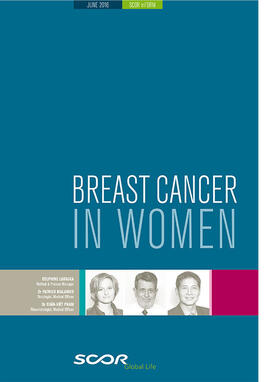Breast Cancer: Early Diagnosis & Higher Survival Rates Lead To Re-Evaluating Risk Assessment
October 23, 2018

Breast cancer is the most prevalent type of cancer in women, where approximately 1 in 8 are diagnosed with this disease during their lifetime. As part of Breast Cancer Awareness month, Professor Eric Raymond, Medical Director at SCOR Global Life’s Underwriting & Claims R&D Centre in Paris, discusses the advances in this rapidly evolving field.
Substantial progress has been made over the last 10 years in medical procedures that allow the early detection of breast cancer while reducing radiation exposure. Additionally, prognostic evaluation and therapeutics, now using both clinical and molecular data, reduce surgical consequences by minimizing the volume of lumpectomies and lymphadenectomies and/or by improving radiotherapy targeting and molecular therapies.
Survival Rates Climb
Together, these advances are leading to a significant increase in breast cancer survival rates and a substantial reduction in health complications, allowing more women with a history of breast cancer to live cancer-free for a prolonged duration with no or very limited consequences from therapy. As a result, it is currently considered that more than 90% of breast cancer patients representing all cancer stages may be cured with a large proportion of patients considered to be long-term survivors.
One of the distinct aspects of breast cancer research is the rapid growth of knowledge in this field, as illustrated by the many publications released each year, which requires a constant survey of novel information that can create quantum leap improvement in earlier diagnosis and cancer therapy. Amongst recent exciting data, genetic and genomic analyses, which are becoming more prevalent in detecting early-stage breast cancer, may be interesting to follow. While there are many gene signatures that are not yet consistent in predicting cancer outcomes, this may progress in the next few years. If we consider that this biotechnology will allow more accuracy and the cost of genomic exploration is reduced, it may spread even more easily if the use of needle biopsy is avoided by testing blood directly through a liquid biopsy.
Risk Assessment Re-evaluated
From a medical underwriting perspective, recent data has shown that when early radiological detection through echography and ultrasound, for example, is combined with molecular analysis, the risk evaluation can be more accurately assessed. This allows the detection of small tumours (limited surgical resection needed) in patients with a very low risk of cancer mortality to avoid the use of systemic adjuvant chemotherapy. As a result, breast cancer clinical presentation and prognostics from 10 - 20 years ago no longer match the current situation and will continue to evolve, requiring constant revision.
Further, it is important to consider that a growing number of patients with a history of breast cancer will remain free of this disease and may be cured. These long-term survivors are challenging the insurance industry, requiring more protection. If we consider that breast cancer may have been a reason to decline coverage 30 years ago, it is striking that today more and more patients who are diagnosed at an early stage may get access to insurance protection.
SCOR Global Life stands at the forefront of risk evaluation for breast cancer and continually upgrades its knowledge and provides evidence-based tools for risk evaluation.
More information about assessing breast cancer risk can be found in the SCOR resource on the sidebar.
